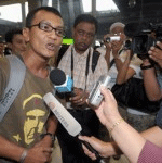March 19th, 2010. Sounding resolute and appearing in good spirits, Kyaw Zaw Lwin walked through Bangkok’s Suvarnabhumi Airport yesterday a free man, after spending 6 months in detention in Burma.

Also known as Nyi Nyi Aung, he spoke briefly to journalists at the airport, saying “I am really happy to be free, but it is not a deep happiness. I have family and friends who are still in jail in Burma.”
Nyi Nyi Aung was jailed on February 10 last, on charges of carrying a fake identification card and undeclared foreign currency and for failing to give up his Burmese citizenship. The regime bars citizens from holding a foreign passport or multiple citizenship. He was arrested in September 2009 at the international airport in Rangoon, accused of attempting to foment political unrest in Burma, and was tortured while in detention. He says he visited Burma to see his mother, San San Tin, who is in prison. She was jailed for her participation in the 2007 Saffron Revolution, and is ill with thyroid cancer.
According to a press release issued by Freedom Now, which provided pro bono legal assistance to Nyi Nyi Aung. prominent US lawmakers were closely-involved in the campaign for his release. These included Senators Barbara Mikulski, Richard Durbin, John Kerry, Richard Lugar, Mitch McConnell, John McCain, and Benjamin Cardin, and Reps. Ileana Ros-Lehtinen, Jim McGovern, and Frank Wolf, among others. Archbishop Desmond Tutu and former Czech President Vaclav Havel are Honorary Co-Chairs of Freedom Now, and both men have been prominent advocates for the release of political prisoners in Burma.
Nyi Nyi Aung is an American citizen, and is travelling back to the US today (Friday). He has a degree in computer science from Purdue University and worked for the U.S Government, at the U.S. Patent and Trademark Office. His fiancee, Wa Wa Kyaw, works as a nurse in Maryland. Her impassioned yet cogently-argued plea for the US to do more to secure Nyi Nyi’s release was published last month in the Wall Street Journal. She concluded – “President Obama and Secretary Clinton, my message is simple. Neither your words nor your actions show that you take my fiancé’s imprisonment seriously. I beg you to stop ignoring his plight, and to help secure his release from this illegal and unjust imprisonment.”
In 2009, US citizen John Yettaw was imprisoned after swimming across a Rangoon lake to Aung San Suu Kyi’s home. Mr Yettaw was later released, after US Democrat Senator Jim Webb visited Burma and met with Sen. Gen, Than Shwe, a privilege denied to UN Secreatry-General Ban ki Moon when he visited Burma just weeks before. Freedom Now confirmed that it did not work with Sen. Webb’s office in seeking Nyi Nyi Aung’s release.
Commenting yesterday on his freedom, Nyi Nyi Aung said that “ I did not expect to be out so soon.” His lawyer, Beth Schwanke, told The Irrawaddy by email that “We’re thrilled that Nyi Nyi has been released. However, it is important to not let his release distract from the larger picture. There are at least 2,100 other political prisoners in Burma.”
On December 17, 2009, a bipartisan group of 53 Members of the US Congress sent a letter to junta leader Sen Gen Than Shwe seeking Nyi Nyi Aung’s release. However despite this request, he was subsequently sentenced to three years imprisonment with hard labour, on February 10 2010, before being freed yesterday.
The New Light of Myanmar newspaper, a mouthpiece for the junta, said the government pardoned and deported Nyi Nyi Aung after giving “special consideration to bilateral friendship in accordance with the request made by the U.S. State Department” to free him.
Beth Schwanke told The Irrawaddy that “it is clear that within the last week the junta has been under considerable international pressure because of its release of new, illegitimate election laws and the call for a Commission of Inquiry at the Human Rights Council.”
The Burmese junta has a history of tactical prisoner release, timed to distract attention from ongoing rights abuses, or to deflect international condemnation for undemocratic policies. In February, National League for Democracy (NLD) Vice-Chairman Tin Oo was released from house arrest, just days before UN human rights envoy Tomas Ojea Quintana made his third visit to the country – a five day series of visits to various prisons, among other locations, which later contributed to the envoy’s analysis that an international commission of inquiry should be established, to investigate war crimes and crimes against humanity in Burma.
Aung Din is Executive Director of the US Campaign for Burma. Welcoming the news of yesterday’s release, he told The Irrawaddy that “he should not be arrested from the beginning”, adding that “we demand the release of all political prisoners in Burma, including Daw Aung San Suu Kyi.” The Obama administration on Thursday welcomed the release of Kyaw Zaw Lwin. State Department Acting spokesman Gordon Duguid said at a news conference, “The United States has been working intensely with Burmese officials for some time to attain his release, and we welcome it. We assisted Mr. Lwin as appropriate and have informed his family of his departure from Burma.”
Nyi Nyi Aung thanked the Burmese and international campaign groups which lobbied for his release and publicised his cause throughout his detention. When asked about the political situation in Burma, he said that “I have just been released, so am not up to date with all the information”. However he pledged that he will work for democracy in Burma as best he could, from outside the country. Nyi Nyi Aung is among the ‘8888 Generation’, a group comprised mainly of university students who took part in pro-democracy protests in August 1988. Those demonstrations were crushed by the ruling junta, with an estimated 3000 lives lost, Many of the 8888 Generation now live in exile, like Nyi Nyi Aung, but others remain incarcerated inside Burma.
Since the 2007 Saffron Revolution, over 1,100 political activists have been arrested and remain in detention. During 2009, according to the Assistance Association for Political Prisoners in Burma, 264 political prisoners were arrested, 129 activists were sentenced, 266 were released, and 71 prisoners were transferred. Year on year, the number of political prisoners in Burma has gone up. As of 31 December 2009 there were a total of 2,177 political prisoners in Burma, an overall increase of 15 in comparison with the previous year’s total, according to the AAPP.
The true figure may be even higher, however, Speaking last month at the launch of the Amnesty International report “The Repression of Ethnic Minority Activists in Myanmar”, Benjamin Zawacki estimated that the real number of political prisoners detained in Burma could be as high as 2,500 or more. 208 ethnic minority political prisoners are currently detained in Burma’s array of jails, according to the AAPP. However AI believes that due to the dearth of accurate information coming out of Burma as well the difficulties faced in accessing prisons, detention centers and ethnic minority areas, the real numbers are almost certainly in excess of what is already known.
In a rueful and ironic aside, Nyi Nyi told The Irrawaddy that “in Burma, the jail is the only place where people can speak freely to each other. Outside it is much more difficult, unless you want to end up inside the prison.”
Lalit K. Jha in Washington contributed to this story.
Source: http://www.irrawaddy.org/article.php?art_id=18077


